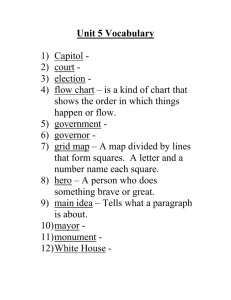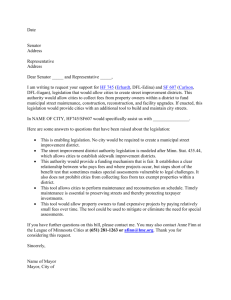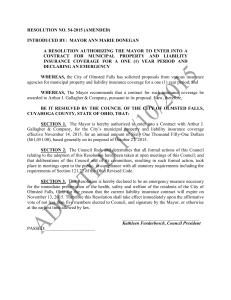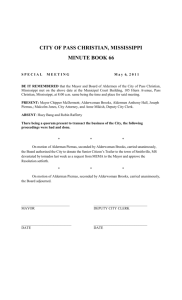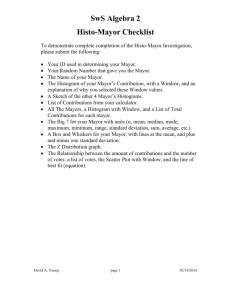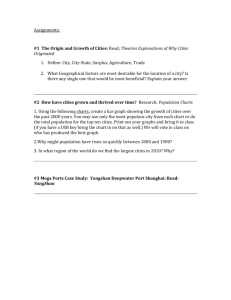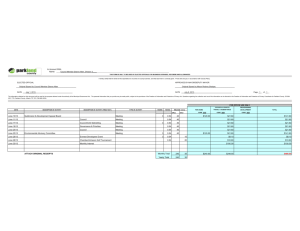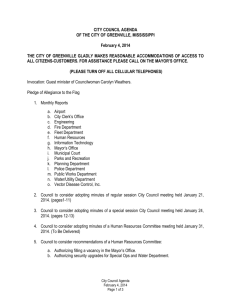Forms of Municipal Government - The John C. Stennis Institute of
advertisement
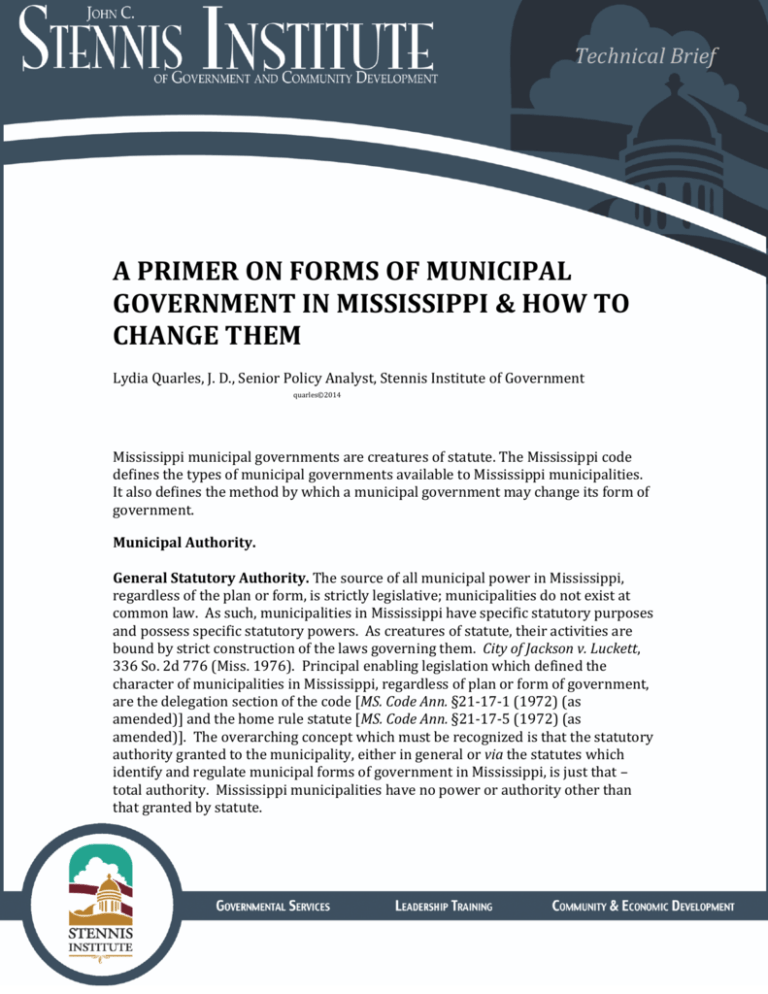
Technical Brief A PRIMER ON FORMS OF MUNICIPAL GOVERNMENT IN MISSISSIPPI & HOW TO CHANGE THEM Lydia Quarles, J. D., Senior Policy Analyst, Stennis Institute of Government quarles©2014 Mississippi municipal governments are creatures of statute. The Mississippi code defines the types of municipal governments available to Mississippi municipalities. It also defines the method by which a municipal government may change its form of government. Municipal Authority. General Statutory Authority. The source of all municipal power in Mississippi, regardless of the plan or form, is strictly legislative; municipalities do not exist at common law. As such, municipalities in Mississippi have specific statutory purposes and possess specific statutory powers. As creatures of statute, their activities are bound by strict construction of the laws governing them. City of Jackson v. Luckett, 336 So. 2d 776 (Miss. 1976). Principal enabling legislation which defined the character of municipalities in Mississippi, regardless of plan or form of government, are the delegation section of the code [MS. Code Ann. §21-17-1 (1972) (as amended)] and the home rule statute [MS. Code Ann. §21-17-5 (1972) (as amended)]. The overarching concept which must be recognized is that the statutory authority granted to the municipality, either in general or via the statutes which identify and regulate municipal forms of government in Mississippi, is just that – total authority. Mississippi municipalities have no power or authority other than that granted by statute. Home Rule. That being said, Mississippi’s home rule statute is a form of authority which allows a municipality to regulate its own affairs and to adopt orders, resolutions and ordinances necessary to do so. Municipal governments have been reticent to stretch the limits of home rule, and with good reason. While the Mississippi Supreme Court has issued few opinions explicitly dealing with home rule, references to the concept demonstrate that past courts have strictly construed home rule. A strict construction of home rule has also been applied in past Attorneys General opinions based on a theory of pre-emption by the state, although General Hood’s administration appears to embrace the pure concept of home rule whenever possible. More recently, the Mississippi Supreme Court has seemed to relax its stringent application of home rule authority. Maynard v. City of Tupelo, 691 So. 2d 385 (Miss. 1997). Prior to discussing the particular forms of municipal government in depth, an explanation of home rule is in order. In 1985 the legislature granted municipalities in the state a limited home rule. [MS. Code Ann. §21-17-5, et seq. (1972) (as amended)] Prior to the adoption of this statute, the only powers a municipality could exercise were those specifically itemized by statute. Home rule has increased municipal power by providing that in addition to the grant of specific powers of a municipality found in the general law, municipalities can adopt any ordinances that they desire regarding municipal affairs for their city, so long as they are not inconsistent with the constitution and statutory law. While there are few Supreme Court decisions available to consider, there are a number of Attorneys General opinions which can shed light, although not legal authority, on some issues of home rule. Form of Government Options. Mississippi statutes provide several options for municipalities to use. These forms of government are inculcated into charters, which establish the concept and bounds of city government. The charter is the document that gives a municipality its power; it is akin to a “constitution” for the municipality. Prior to the adoption of the Mississippi Constitution of 1890, each established municipality had a document known as the municipal charter. After the adoption of the constitution, the manner by which municipal charters would be granted were established by law. Section 88 of the constitution states: “The legislature shall pass general laws, under which local and private interest shall be provided for and protected, and under which cities and towns may be chartered and their charters amended….” [Mississippi Constitution of 1890, Article 4, §88] This section was implemented by the legislature in 1892, at which time municipalities were permitted to keep their existing charter, now referred to as a special charter, or elect to be governed by a code charter. Newly developing cities and towns were required to utilize the code charter established in 1892. At that time, the legislature only designated one form of municipal government, called the mayor-board of aldermen form of government. This form is still often referred to as a code charter, even though, as the legislature has passed amendments allowing other forms of municipal governance, each of the subsequent forms has become a code charter form as well because the primary elements of each form is established in the Mississippi code. Mississippi statute recognizes several forms of municipal government in the 21st century: Mayor-Board of Aldermen Form of Municipal Government [also known as the “weak mayor” form as well as a “code charter”] [MS. Code Ann. §213-1, et seq. (1972) (as amended)] Commission Form of Municipal Government [MS. Code Ann. §21-5-1, et seq. (1972) (as amended)] Council-Manager Form of Municipal Government [MS. Code Ann. §21-9-1, et seq. (1972) (as amended)] Mayor-Council Form of Municipal Government [MS. Code Ann. §21-8-1, et seq. (1972) (as amended)] Special Charter Form of Municipal Government [also known as “private charter”] [Mississippi Constitution of 1890, Article 4, §88] Council Form of Municipal Government [MS. Code Ann. §21-7-1, et seq. (1972) (as amended)] These code sections, when adopted, applied only to Tupelo. Tupelo has abandoned this form in favor of the mayor-council form. Since the qualifying use of the council form is governed by population based on the 1940 federal census, no other municipality will qualify to utilize the council form of government. Mayor-Board of Aldermen Form of Municipal Government [also known as the “weak mayor” form as well as a “code charter”]. Of Mississippi’s 300 municipalities, over 95% of these have opted for the Mayor-Board of Aldermen form of government. The overwhelming majority of these municipalities have populations of less than 10,000. Under the Mayor-Board form, there is a mayor and either 5 or 7 aldermen, depending on population. A municipality with a population of less than 10,000 has 5 aldermen; a municipality with a population of 10,000 or more has 7 aldermen. Characteristics: The 5 elected officers of the municipality (municipal judge, marshal or chief of police, tax collector, tax assessor, and clerk) may be made appointed at the discretion of the mayor and board. When appointed, the individual serves at the will and pleasure of the mayor and board. The appointed officer need not live within the city limits; that is discretionary with the governing body. The mayor and all board members must be qualified electors of the municipality. The mayor and all board members must be chosen by election. The mayor is elected from the municipality at large. Aldermen are either elected at large, by ward, or by some combination of the two. (All aldermen elected by ward must be residents of their ward.) In municipalities with 5 aldermen, they may be elected entirely at large, or 1 may be elected at large and 4 by ward. In municipalities with 7 aldermen, 6 are to be elected by ward, with 1 at large. (While the statute has not been modified since1962, it was voided as a device developed to further racial discrimination. Stewart v. Waller, 404 F. Supp. 206 (N.D. Miss. 1975) Mayors and boards are elected in a general municipal election held on the first Tuesday after the first Monday of June, beginning in 1985 and every 4 years thereafter. Primary elections are held on the first Tuesday in May preceding the general election. If a runoff primary election is required, it is held the third Tuesday in May preceding the general election. If a mayor or alderman moves from his ward, the vacancy is filled in the manner established by Miss. Code Ann., §23-15-857 (1972) (as amended). Powers, Duties and Responsibilities of Elected officials: MAYOR The mayor has “superintending control” of all officers and affairs of the municipality and is charged with the responsibility of seeing that the laws and ordinances are executed. The mayor presides over all meetings of the board of alderman. The mayor can vote only in the case of a tie. The mayor has power to veto any ordinance, resolution, or order adopted by the board of aldermen by returning the measure together with a written statement of his objections, within 10 days. The mayor is required to sign all commissions and appointments of officers chosen by the mayor and board of aldermen. The mayor is required to approve all bonds of municipal officers. BOARD Only members of the board can make motions and cast votes (except in a veto situation, when a mayor can cast a vote). The board is required to elect a mayor pro tempore to preside over meetings in the temporary absence of the mayor or during a period of his disability. The board may override the mayor’s veto by a vote of 2/3 of the total number of board members. SHARED POWERS and DUTIES The mayor and board share various powers and duties: o Appointing and dismissing officials and employees o Determining various elective offices to be appointive o Appointing a street commissioner and such other officers and employees as may be necessary, prescribing their duty and fixing their compensation. o Establish the position of chief administrative officer by ordinance requiring a 2/3 vote of the total number of board members. Meeting requirements: Must hold regular meeting on the first Tuesday of each month at a time and place fixed by ordinance May hold a second regular meeting not less than 2 weeks or more than 3 weeks after the first regular meeting A quorum is required for business (simple majority of aldermen elected) A mayor and any 2 aldermen may call a special meetings All meetings are subject to the provisions of the Open Meeting Act. Commission Form of Municipal Government [MS. Code Ann. §21-5-1, et seq. (1972) (as amended)] The commission form of government is the plan of choice among Mississippi’s larger municipalities, with 14 Mississippi municipalities utilizing this form at one time or another. Currently, Clarksdale and Vicksburg are the only municipalities with commission forms of government. Each has, however, modified its electoral system to remove the at-large voting prerogative in order to meet the requirements of the Voting Rights Act of 1965. Characteristics: A commission form of government includes a mayor and 2 commissioners. The 3 are collectively known as the commission. The commission has the power to perform all the corporate powers, duties, and obligations possessed by the municipality (acting separately, the mayor and commissioners serve as department heads). Each member of the commission may vote on all questions coming before the body. The commission fixes compensation of the mayor and commissioners and establishes office hours. Each commissioner must be a qualified elector and bona fide resident of the municipality for a period of at least one year. As a result of the Voting Rights Act, the mayor in a commission form is elected at large, but the 2 commissioners are elected by and from wards. A general municipal election is held every 4 years. Powers, Duties and Responsibilities of Elected officials: MAYOR The mayor is the nominal head of the commission and is responsible for presiding over its meetings The mayor has no veto power “General supervision of all the affairs and departments of the city government” is vested in the mayor but the mayor cannot hire and fire independently Unless the commission grants the mayor authority over personnel, finance and other management functions, he is merely one of 3 equals SHARED POWERS and DUTIES The commission acting as a body exercises all executive, legislative and judicial powers of the municipality as given by statute Meeting requirements: The commission is required to meet on the lst Monday in July following the quadrennial municipal election and to thereafter meet twice a month Special meetings may be called at any time by the mayor or by two commissioners A majority of commissioners constitutes a quorum for the transaction of business All meetings are subject to the Open Meetings Act Council-Manager Form of Municipal Government [MS. Code Ann. §21-9-1, et seq. (1972) (as amended)] The council-manager form of government came on the scene in Mississippi in 1952. An elected council is responsible for establishing policy; administration of the policy is assigned to an appointed professional, known as a manager. This form is utilized only in D’Iberville, Diamondhead, Gautier, Grenada, Moorhead, Pascagoula and Picyune. Characteristics: The governing body (or council) is made of 6 members, 5 councilmen and a mayor. The council exercises all legislative power, while the mayor serves as the “titular head of the city for ceremonial purposes and for all processes of law.” Neither the mayor nor councilmen can exercise any administrative power. The mayor and councilmen must be qualified electors. The mayor is elected at large, while the councilmen are elected from wards. The councilmen must be a resident of the ward he represents. A general municipal election is held every 4 years. Powers, Duties and Responsibilities of Elected officials: MAYOR The mayor is the president of the council and has a voice and vote in all proceedings, but no veto power The mayor is not required to maintain an office or keep office hours The council may appoint the city attorney, auditor, municipal judge, and in its discretion the city clerk and treasurer COUNCIL The council may investigate any part of municipal government and has subpoena power to compel witnesses and require them to produce evidence The council may create new departments, fix duties and powers, and establish compensation on the recommendation of the manager The council fixes hours, and sets its own compensation as well as the compensation of the mayor and manager The council may appoint one member to act in the absence or disability of the mayor The council may appoint one member to act in the absence or disability of the manager If the office of the manager becomes vacant, the council must appoint an acting manager “without delay” Council members are not required to maintain an office or keep office hours Council members are prohibited from serving on any board or commission appointed by the council or under its jurisdiction The council must adopt an annual budget and requiring surety for all officers and employees handling funds An affirmative vote of a majority of all council members is required for the passage of any measure The manager and any other officer approved by the council may attend and participate in discussions, but cannot vote SHARED POWERS and DUTIES The mayor and council set policies The mayor and council are specifically prohibited by statute from directing or dictating either the appointment or removal any employee who is appointed by the city manager All contact between the council and administrative services must be through the manager (with the sole exception of seeking information or advice from the administrator) The mayor and/or council has no authority to give orders to any subordinate in the municipality’s employ MANAGER The manager is the administrative authority in the council-manager form The manager has absolute administrative authority to carry out the policies of the city as established by the mayor and council All municipal employees not mentioned are appointed by the city manager The manager is the chief administrative officer of the municipality The manager must be appointed at a regular meeting of the council The manager must be selected solely on the basis of “experience and administrative qualifications” by no less than a majority vote of the total membership of the council The manager may engage in no other business or profession while employed as manager No member of the council may be appointed city manager during the term in which he is elected The manager’s appointment is fixed by the council but may not exceed a 4 year term A manager may be successively reappointed A manager can be removed at any time by a majority vote of the council, provided he has seen a written copy of the charges against him The manager is expressly excluded from the provisions of civil service Specific duties that are authorized for performance by the manager only are: Prepare and recommend an annual budget Administers and secures enforcement of all laws and ordinances Appoints and removes all department heads and employees Supervises and controls all department heads and other employees and their subordinates Negotiates contracts and makes purchases, subject to council approval Enforces franchises and other contracts Makes reports and recommendations he deems “expedient and necessary” as well as any requested by the council Submit an annual report of his work and the financial condition of the municipality Perform other duties required by ordinance and resolution of council Meeting requirements: The council is required to meet regularly on the first Tuesday of each month at a time and place established Special meetings can be called at any time by the major or two councilmen, but at least 2 days’ notice must be given to the mayor and each council member Special meetings may be called upon written consent of the mayor and all councilmen A majority of council membership constitutes a quorum All meetings are subject to the Open Meetings Act Mayor-Council Form of Municipal Government [MS. Code Ann. §21-8-1, et seq. (1972) (as amended)] The mayor-council form of government is essentially a “strong mayor” form of government made available by the legislature in 1973 and approved by the Department of Justice in August 1976. It is used in 10 municipalities in Mississippi: Bay St. Louis, Biloxi, Columbus, Greenwood, Gulfport, Hattiesburg, Jackson, Laurel, Meridian and Tupelo. Existing civil service laws apply in a mayor-council form. Characteristics: The governing body consists of an elected mayor and an elected council consisting of either 5, 7 or 9 members. Legislative authority is exercised by the council; executive power is exercised by the mayor. All officers and employees are appointed in the mayor-council form of government. The number of councilmen is determined and contained in the petition calling for the election to adopt the mayor council form of government. The mayor and councilmen must be qualified electors. The mayor is elected at large, while the councilmen are elected from wards. The councilmen must be a resident of the ward he represents. If a mayor or alderman moves from his ward, the vacancy is filled in the manner established by Miss. Code Ann., §23-15-857 (1972) (as amended). A general municipal election is held every 4 years. Powers, Duties and Responsibilities of Elected officials: MAYOR The mayor is charged with enforcing the charter and ordinances of the municipality, as well as applicable general laws The mayor is responsible for supervising all departments of municipal government and requiring them to make an annual report and requesting other reports as necessary The mayor appoints department heads and members of any municipal board, authority or commission, subject to confirmation by a majority of council members present and voting The mayor may attend all council meetings, take part in discussions, make recommendations, but he cannot vote except in case of a tie on the questions of filling a vacancy in the council The mayor must review ordinances, resolutions, orders and other official actions of the council The mayor may veto ordinances, but the veto may be overridden by 2/3 of the council present and voting The mayor is required to maintain an office at city hall COUNCIL The council is the legislative body and functions as such The council elects one member to serve as president and another to serve as vice-president The president (or vice-president in the president’s absence) presides over council meetings and may vote when he is presiding The council appoints a “clerk of the council” and any necessary deputies Whenever the mayor is unable to appoint a councilman to serve as acting mayor, the council may do so. The council may establish a department of administration and any other departments, and allocate and assign all administrative powers, functions and duties The mayor appoints all department heads and directors, but they are confirmed by the council The council is authorized to adopt an ordinance creating and setting the qualifications of chief administrative officer to be appointed by the mayor and confirmed by the council The council is empowered to: o Set compensation o Redistrict after every decennial census and after annexation o Require any municipal officer to prepare and submit a sworn statement regarding his official duties o Causing a complete audit at the end of the fiscal year o Investigating the conduct of any department, office or agency; o Appropriating money for the operation of government o Overriding vetoes of council actions o Appointing a council member to serve as acting mayor if the mayor is incapacitated o Calling a special election to fill a mayor’s unexpired term o Requiring surety bonds for those handling public funds o Council members are not required to maintain individual offices at city hall unless the municipality’s population exceeds 190,000 o Council members have no authority to seek to dictate or require appointment or removal of a city employee o Council members must deal with department heads through the mayor Meeting requirements: The council is required to hold meetings on the first Tuesday after the first Monday in July following the election of council members and at least monthly thereafter Special meetings can be called at any time by the major a majority of the members of the council Special meetings may be called upon written consent of the mayor and all councilmen A quorum of the council is a majority of members elected Where a quorum exists, a majority of members may adopt any motion, resolution, or ordinance unless a greater number of votes is specifically required All meetings are subject to the Open Meetings Act Special Charter Form of Municipal Government [also known as “private charter”] [Mississippi Constitution of 1890, Article 4, §88] There are very few special charter municipalities remaining in Mississippi. While each have particular eccentricities (including holding elections at unusual times), they can be easily analogized to code charter municipalities. Council Form of Municipal Government [MS. Code Ann. §21-7-1, et seq. (1972) (as amended)] These code sections, when adopted, applied only to Tupelo. Tupelo has abandoned this form in favor of the mayor-council form. Since the qualifying use of the council form is governed by population based on the 1940 federal census, no other municipality will qualify to utilize the council form of government. Ability of the Governed to Change Municipal Form of Government. Statutes prescribe what is required of electors in order to facilitate a change in their form of government. These statutes are principally located in Miss. Code Ann. §21-91, et seq. (1972) (as amended). Efforts to change forms of government are normally elector-driven with the change being contingent on the outcome of a general election (either regular or special) held for that purpose. Note that special elections are governed by Miss. Code Ann. §21-9-65, et seq. (1972) (as amended). At least 10% of qualified electors must sign a petition attesting to the desire to change the municipality’s form of government. These petitions must be filed with the City Clerk. If a municipality has a population of less than 40,000 individuals and desires to move to the Mayor-Council form, the petition must be signed by at least 20% of qualified electors. If, in the special election to move to a Code Charter, the petition fails, it cannot be reconsidered for a period of 4 years. If, in the special election to move to a MayorCouncil or Council-Manager form, the petition fails, it cannot be reconsidered for a period of 2 years. Petitions and Special Elections. Miss. Code Ann., §21-9-65 (1972) (as amended) defines the methodology to be applied to petitions and special elections. This appears in the council-manager chapter, but applies to all petitions for a special election to change the form of government unless indicated below. The general statute requires the petition(s) to be addressed to the mayor, specifically demanding an election or protesting against or requesting the adoption of such ordinances. These petitions shall be signed by at least 25% of all the qualified electors of such municipality and shall be filed with the city clerk. This section excepts various aspects of the section for particular petitions, and we shall see that in changing forms of government, there are exceptions to the percent of qualified electors who must petition. Each petition must have attached to it an affidavit executed by one or more of the signers of the petition, testifying the total number of names signed to the petition at the time of filing the petition. Unless an affidavit is attached, the clerk shall not receive or file a petition. Once a petition has been filed with the city clerk, the clerk will endorse the filing date upon the petition and then, within 10 days of filing, verify the signatures by comparing them to the voter registration list and poll books. The clerk then delivers the petition to the mayor, together with a clerk’s certificate showing of the total number of qualified electors and the number of qualified electors who have signed the petition(s). The certificate will be prima facie proof of the percentage of voters who executed the petition(s). If it appears from the petition(s) and the clerk’s certificate that the petition(s) is proper, it is the duty of the council at its next regular meeting to order such special election, or to refer the proposed ordinance to a vote of the electors of such city, in the case of their failure to wholly repeal the same. A special election must be held no less than 30 days nor more than 60 days from the date of ordering the special election. If a special election occurs during this time period, the matter can be referred to and voted upon at the general election. All special elections are conducted as other elections in the city. Changing to a Council-Manager Form. One or more petitions, in similar form and substance, addressed to the mayor, can ask that an election be held to determine whether or not the municipality should abandon its existing form of government and become organized under a mayorcouncil form of government. The petition must be signed by at least 10% of the qualified electors; however, if the population of the municipality is less than 40,000, then the petition must be signed by at least 20% of the qualified electors. Once a petition has been filed with the city clerk, the clerk will endorse the filing date upon the petition and then, within 10 days of filing, verify the signatures by comparing them to the voter registration list and poll books. The clerk then delivers the petition to the mayor, together with a clerk’s certificate showing of the total number of qualified electors and the number of qualified electors who have signed the petition(s). The certificate will be prima facie proof of the percentage of voters who executed the petition(s). If it appears from the petition(s) and the clerk’s certificate that the petition(s) is proper, it is the duty of the council or board, within 5 days, order and provide for the holding of a special election in the municipality not less than 20 days nor more than 60 days from the date of making such order. A special election must be held no less than 30 days nor more than 60 days from the date of ordering the special election. If a special election occurs during this time period, the matter can be referred to and voted upon at the general election. All special elections are conducted as other elections in the city. If the petitioners prevail, then the questions shall be stated on the ballot as: Question 1: FOR THE COUNCIL-MANAGER PLAN OF GOVERNMENT. Question 2: FOR COUNCILMEN ELECTED AT LARGE FOR COUNCILMEN ELECTED BY WARDS Based on decisions made by the Department of Justice in the past, it is unlikely that councilmen elected at large would have been approved. However, since the decision in Shelby County v. Holder, the Department of Justice no longer has to approve ordinance or statute changes which impact on voting rights. Discontinuing a Council-Manager Form. If a municipality has adopted the council-manager plan and has operated under it for a period of 3 years, it may be discontinued by a vote of the electors if a petition of 20% of the qualified electors have signed the petition, allowing the council to call a special election. The question on the ballot shall be: FOR THE COUNCIL-MANAGER FORM OF GOVERNMENT AGAINST THE COUNCIL-MAMAGER FORM OF GOVERNMENT. If the petitioners prevail and the council-manager plan is discontinued, the next municipal election shall be conducted for such officials as are provided by law for the city under and according to the form of government under which it operated prior to adopting the council-manager plan. Those holding office under the councilmanager plan will remain in their positions until the new officers have been elected. The council shall have the power, by ordinance not inconsistent with law to provide for the orderly transition from one form of government to the other. Changing to a Code Charter Form. The code charter is the standard form of municipal government and is, at this time, the type of municipal government under which most municipalities are chartered. It is rare that municipalities change to a code charter, although they may change back to a code charter after having experimented with another form of government. Changing to a Mayor-Council Form. One or more petitions, in similar form and substance, addressed to the mayor, can ask that an election be held to determine whether or not the municipality should abandon its existing form of government and become organized under a mayorcouncil form of government. The petition must be signed by at least 10% of the qualified electors; however, if the population of the municipality is less than 40,000, then the petition must be signed by at least 20% of the qualified electors. If the petitioners prevail, then the question shall be stated on the ballot as: FOR THE PRESENT FORM OF GOVERNMENT FOR THE MAYOR-COUNCIL FORM OF GOVERNMENT. If the petitioners do not prevail, another petition seeking the mayor-council form of government cannot be accepted by the clerk unless 2 years has elapsed from the date of the last election. There is no waiting period for the presentation of a petition for a different form of government (not mayor-council), except that such a petition cannot be presented and/or accepted by the clerk until after the date of the mayorcouncil form of government. Changing to a Commission Form. A municipality can change its form of government to a commission form of government if the proponents of the change adequately petition the municipality and prevail in a special election. At the election, the propositions to be voted on shall be: FOR THE PRESENT FORM OF GOVERNMENT FOR THE COMMISISON FORM OF GOVERNMENT If the proponents of the change are victorious, an election for officers of the commission form of government shall be held on the first Tuesday after the first Monday of June the next thereafter. If the voters petitioning for change fail at the special election, a special election to change the form of government to a commission form shall not be held for a period of at least 4 years. Strengths and Weaknesses of Available Forms of Municipal Government in Mississippi. Political scientists and policy makers generally agree on the following strengths and weaknesses of the forms of government available to Mississippi municipalities. MAYOR-COUNCIL: 1. Executive and legislative powers are divided logically between the mayor and the council 2. Administrative power is consolidated under a single individual who is elected at large and given sufficient appointive and removal power to make him accountable for implementing policy 3. Council can focus on major policy needs, not day-to-day administration 4. Mayor can provide both strong administrative leadership and strong policy leadership 5. Separation of powers can lead to conflict and deadlock between the mayor and council 6. Politically strong mayor may not possess the qualities essential to a good administrator (the remedy could be a chief administrative officer) MAYOR-BOARD OF ALDERMEN 1. Mayor is truly a “weak” mayor; he is given responsibilities identified previously but is not given sufficient power under this form to fulfill his responsibilities. 2. The mayor has limited control over non-elective officers, and the statute allows various administrative officers to be elected, although most cities have demurred in recent memory 3. A talented “weak” mayor can forge a partnership with his board assuming board members are interested in partnership. COMMISSION 1. Government structure is simplified 2. Power and authority are centralized in a few individuals who can be held accountable for their actions 3. Power may be too centralized, as those who make policy are responsible for its execution 4. Division of administrative authority among and between the commissioners tends to narrow the focus of the commissioners, rather than seeing the municipality as a whole 5. Absence of a chief executive lessens the likelihood of strong policy leadership COUNCIL-MANAGER 1. Control of administration is centered in a single, professionally trained, individual 2. Government is organized along the lines of modern business; the manager is the corporate manager while the council functions as a board of directors 3. Professional administration tends to provide a more effective and costefficient delivery of services 4. Strong policy leadership is made difficult because the mayor and council are a body of equals 5. The 6 member council established under the statute makes legislative deadlock a very real possibility 6. Elected council may tend to rely too heavily on the manager, even though the law subordinates the manager to the council. Conclusion. There are various pros and cons to each of the forms of municipal government offered by statute to Mississippi municipalities. And due to the fact that electors change their elected officials often, the character of officials, their ability to work with others, their understanding of their particular “place” in the cogs of municipal government and other personal quirks may sometimes make the best government form become a disastrous exercise in government. The fact is that changes in government forms are usually elector-driven, and rarely developed as a policy change by the governing body of the municipality. Effective changes in municipal forms of government rely on grass-roots work to educate the electors on the changes, the benefits of the changes, and rally them to sign an appropriate petition and, later, turn out to vote. This is difficult because of the strength of the status quo and the amount of energy necessary to overturn it. The truth is that any of the forms of government can be effective if elected officials understand their duties and obligations to the electors and defer to the individuals who are given powers that are not delegated to them by statute. ABOUT THE AUTHOR Lydia Quarles is a Senior Policy Analyst at the John C. Stennis Institute of Government, Mississippi State University. She received her Juris Doctorate from Cumberland School of Law, Samford University, and her MA and BA from Mississippi University for Women. After over a dozen years in the private practice of law in Alabama and Mississippi, she joined the Mississippi Workers’ Compensation Commission as an Administrative Judge in 1993. Eight years later, in 2001, she was appointed Commissioner of the agency. In 2006, she resigned to join the Stennis Institute and return to private practice. Quarles was honored in 2006 by the American Bar Association’s Administrative Law and Regulatory Practice Section, receiving the Mary C. Lawton Award for lasting contributions to the Mississippi Workers’ Compensation Commission in the areas of alternative dispute resolution and access for Hispanic workers. She is also a recipient of the American Society of Public Administrators’ Joan Fiss Bishop Award, honoring a woman who has promoted increased participation of women in public administration, exhibited a defined contribution to increase women’s involvement in the public sector, and demonstrated innovative leadership and accomplished professionalism in her own public sector career. Recognized by Martindale-Hubbell as an AV rated lawyer, the highest peerevaluated designation, she also holds the Martindale-Hubbell designation as a Preeminent Women Lawyers in America. ABOUT THE INSTITUTE Based at our state's land grant university, the Institute is often referred to as Mississippi's think tank, but the Institute is much more. We are frequently called upon to provide technical assistance and consultation to state officials, local governments and community leaders regarding political, governmental, and economic and community development matters. Our mission is to enhance the capacities of state and local officials to deal effectively with today's challenges regarding many issues. If the legislature needs a definitive study on the effects of a change in state law, a municipal government desires a compensation study or salary survey, or an association of government officials’ requests training on the latest legal or policy issues, the Institute responds with its wide variety of resources and capabilities. CONTACT INFORMATION John C. Stennis Institute of Government and Community Development 382 Hardy Road Mississippi State, MS 39762 Ph: 662-325-3328 Fax: 662-325-3772 Mailing Address: Stennis Institute PO Drawer LV Mississippi State, MS 39762 Mississippi State University does not discriminate on the basis of sex, race, age, sexual orientation, ethnicity, etc. Mississippi State University is an equal opportunity employer.
